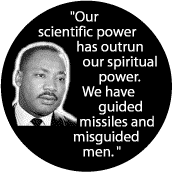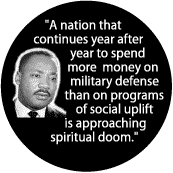
Merton writes of the essential foundation of self-realization:
“Since I am a man, my destiny depends on my human behavior: that is to say upon my decisions. I must first of all appreciate this fact, and weigh the risks and difficulties it entails. I must therefore know myself, and know both the good and the evil that are in me.
“It will not do to know only one and not the other...I must then be able to love the life God has given me, living it fully and fruitfully, and making good use even of the evil that is in it. Why should I love an ideal good in such a way that my life becomes more deeply embedded in misery and evil?
If I can understand something of myself and something of others, I can begin to share with them the work of building the foundations for spiritual unity. But first we must work together at dissipating the more absurd fictions which make unity impossible.”1
For many, God is identified as part of the problem, as an agent of the oppressor. For these people, the evolution of human society means to move past the idea of a God who watches over all, over whom we must serve out of obligation and out of love. Social justice remains solely an earthly concern, devoid of the supernatural presence. It depends solely on human endeavor, human wit, human emotion, and human ability, but to the committed spiritual activist this hope on mere humanity itself is a pipe-dream.
Humanity without a sense and connection to God's presence is not a fully capable or realized humanity. Its revolutions, even if they temporarily succeed, will then only dissolve back into the systems, structures, and injustices that the revolutionaries originally fought against.
I may still find myself rooting on green-shirted protesters in Iran of black-shirted anarchists smashing Burger King windows at the latest meeting of the World Bank, but a deeper calling comes through my conditioning. Standing as someone who is trying to reconcile my spirituality with my yearning for justice I feel as an outsider yet again looking in. Can I convince others of God's place in this discussion? Can I help to show them He is the real friend and the one who empowers the oppressed, rather than the lord and overseer of the oppressor?
A great courage and resolve is needed to remain firm to God's message in the realm of social justice, to not be convinced and swept up in actions devoid of any supernatural motivation. One has to remain in a sense above the fray, while not becoming aloof. Merton comments:
“People are constantly trying to use you to help them create the particular illusions by which they live. This is particularly true of the collective illusions which sometimes are accepted as ideologies. You must renounce and sacrifice the approval that is only a bribe enlisting your support of a collective illusion.
You must not allow yourself to be represented as someone in whom a few of the favorite daydreams of the public have come true. You must be willing, if necessary, to become a disturbing and therefore an undesired person, one who is not wanted because he upsets the general dream. But be careful that you do not do this in the service of some other dream that is only a little less general and therefore seems to you to be more real because it is more exclusive!”2
The spiritual activist committed to social justice must use his most developed and sincere intelligence to tread a careful path: first, to understand and imbibe the presence of God's desire for his/her life and to act constantly upon that desire, then, to apply that desire in the fields of justice without letting it become diluted into mere politics, and finally to learn the art of disturbance as mentioned above.
This art of disturbance requires a tender balance, between being forceful enough to shed the light and message of God through in the realm of justice with enough strength to convince others, even the doubtful, of the need for God's presence, and at the same time being tender enough, astute enough, not to completely alienate the intended audience and also any potential new recruits to the cause.
This mixture is so potent, and it allows the committed spiritual activist to bridge gaps in a way that make history. We can look to Rev. Martin Luther King, Jr as one of the most clear examples of someone who came as close as possible to perfecting this art of disturbance, but we shouldn't feel that his lofty example can't be emulated in our own way, in our own lives, and in our own particular set of circumstances.
Even if we try to ignore the potency of God and His love, we will have to acknowledge His absence, even unconsciously, in our failure to reflect it in our duties of justice and compassion. We cannot complete our own humanity, and any attempt to restore the humanity of others, without the touch of the kingdom of God, and this kingdom is so wonderful, life-affirming, and redemptive that it lays bare the faults and emptiness of the “kingdom” we call our attempted civilization. It is our duty and our struggle to make this contrast unavoidable to look at.
1Merton, 95
2Merton, 97

No comments:
Post a Comment